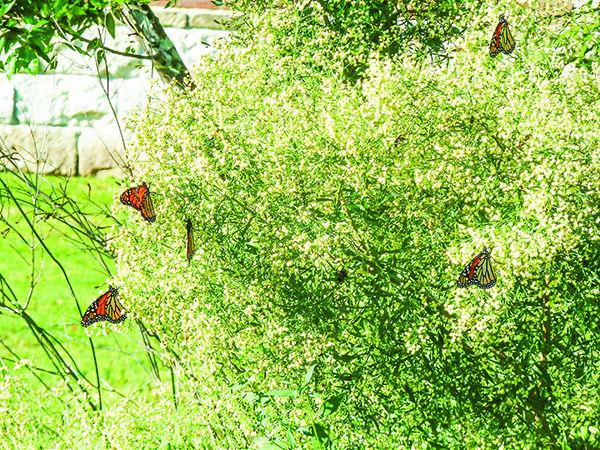An A&M researcher has paired with College Station citizens to save one of North America’s longest migrations from a serious threat — mowing practices.
Milkweed is critical to the monarch butterfly’s thousand-mile journey across the American Midwest, however the wildflower’s presence is endangered by national mowing practices. Local citizens and a Texas A&M researcher are working to correct this situation in Bryan-College Station, but they say further steps must be taken if the migration is to be preserved.
Monarch larvae and caterpillars depend on milkweed to develop, but the wildflower’s growing disappearance is in part responsible for the decimation of the monarch’s population. Craig Wilson, senior research associate at Texas A&M’s Center for Mathematics and Science Education, said mowing local highways before the wildflowers have a chance to seed contributes to this population decline cycle.
“Delaying mowing in fall until [milkweed has] seeded is a must,” Wilson said. “Delaying mowing in spring until the monarchs have passed through in March means there will be milkweed leaves for the Monarch caterpillars to eat. Often in Bryan-College Station, Highway 6 is mowed when the wildflowers look untidy but that is when they are seeding and have stopped flowering and need to be left.”
College Station citizen and monarch enthusiast Ann Boehm said she has advocated to College Station City Council for a more monarch-friendly area.
“About two years ago, as a result of articles I had read from Craig Wilson, I made a presentation to the College Station City Council on the importance of a grassroots effort to plant milkweed in Aggieland, as the Brazos Valley is a throughway for the monarch migration from the United State to Mexico,” Boehm said. “Immediately following the brief presentation, I was approached by David Schmitz, the director of Parks and Recreation who was immediately on board with planting more milkweed in College Station.”
Boehm said the city has been very helpful with her efforts.
“Every time I have reached out, Mr. Schmitz has been available and attentive, most recently the City of College Station has planted milkweed, a necessary staple for the monarch in several parks and cemeteries,” Boehm said.
Boehm has many ideas as to how the community can easily get involved in protecting one of the world’s greatest wonders.
“‘Feed a Monarch’ could be a great program,” Boehm said. “And how about ‘The Howdy Farm’ grow plants from milkweed seeds that could be used in the Big Event for planting along the many creeks, water draws and ponds in the area. From Millican to Bryan, feeding the monarchs should not be abdicated to the government. As citizens of this world, we must care for all creatures great and small. Just imagine — ‘Butterflies in the Brazos’ could be an event that draws attention to the area and as well as our conservation efforts.”
Wilson said he hopes that by raising awareness of the importance of the milkweed, big companies in the area will decide to help out as well.
“I can approach Lowes again as a possible corporate sponsor and Home Depot as they are national and could sell milkweed plants in season that have not been treated with a pesticide,” Wilson said.
Milkweed is not just needed along highways, but in all areas, Wilson said. Any habitat can be made into a “monarch waystation” — a place that provides the necessary resources for the butterflies to repopulate and continue their migratory cycle.
“There is a need for more waystations across the U.S.A.,” said Jo Anne Bates, volunteer at the Camelot Park monarch waystation. “One of the reasons for the decline in monarchs is the lack of summer breeding grounds.”
Mowers vs. Monarchs: Grass-cutting practices worsen butterfly problem
November 4, 2014

Photo Provided
Monarch butterflies have experienced a sharp population decline due to habitat loss in B-CS and around the U.S.
0
Donate to The Battalion
Your donation will support the student journalists of Texas A&M University - College Station. Your contribution will allow us to purchase equipment and cover our annual website hosting costs.
More to Discover








